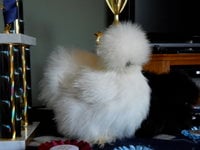General Information
- Breed Purpose
- Ornamental
- Comb
- Walnut
- Broodiness
- Frequent
- Climate Tolerance
- All Climates
- Egg Productivity
- Medium
- Egg Size
- Medium
- Egg Color
- Light Brown/ white
- Breed Temperament
- Friendly, Easily handled, Calm, Bears confinement well, Quiet, Docile
- Breed Colors/Varieties
- Grey, Blue, Splash, Partridge, Buff, Black, White are the standard colors with many off standard & derivative colors in existance today.
- Breed Size
- Bantam
- APA/ABA Class
- Feather Legged
- Color
- Grey, Blue, Splash, Partridge, Buff, Black, White are the standard colors with many off standard & derivative colors in existance today
The Silkie breed was developed in the southeast Asian countries or China. It's named for its atypically fluffy plumage, which is said to feel like silk. The breed has several other unusual qualities, such as black skin and bones, blue earlobes, and five toes on each foot, whereas most other chickens only have four. They are often exhibited in poultry shows and come in various colors. It was valued as a medicinal food item in Asia, because of its black skin and bones, and was thought to be particularly good to reinforce body immunity and protect from emaciation and feebleness. It also is reported to treat diabetes, anemia, female reproductive functioning and postpartum disorders. Marco Polo gave the first accounts of Silkie chickens in the late 13th century. As trade route between East and West were established, the Silkie was brought to Europe. Records have shown that in the Netherlands, they were sold as the product of crossing a rabbit and a chicken!
Nowadays the breed is very popular for the purpose of pet chickens as well as exhibition. They are not good layers, averaging 3 eggs per week, but are known and valued for their exceptional broodiness and are often used for hatching eggs from other breeds. They are also considered very good pet chickens, especially for children and are known for their friendliness and docile temperaments.
The breed was officially recognized in North America by acceptance into the Standard of Perfection in the first year of publication which was 1874.

Silkie juvenile

Silkie chick

Silkie rooster

Silkie hen
For more information on Silkies and their owners' and breeders' experiences with them, see our breed discussion here:
https://www.backyardchickens.com/threads/chicken-breed-focus-silkie.1048544/









































